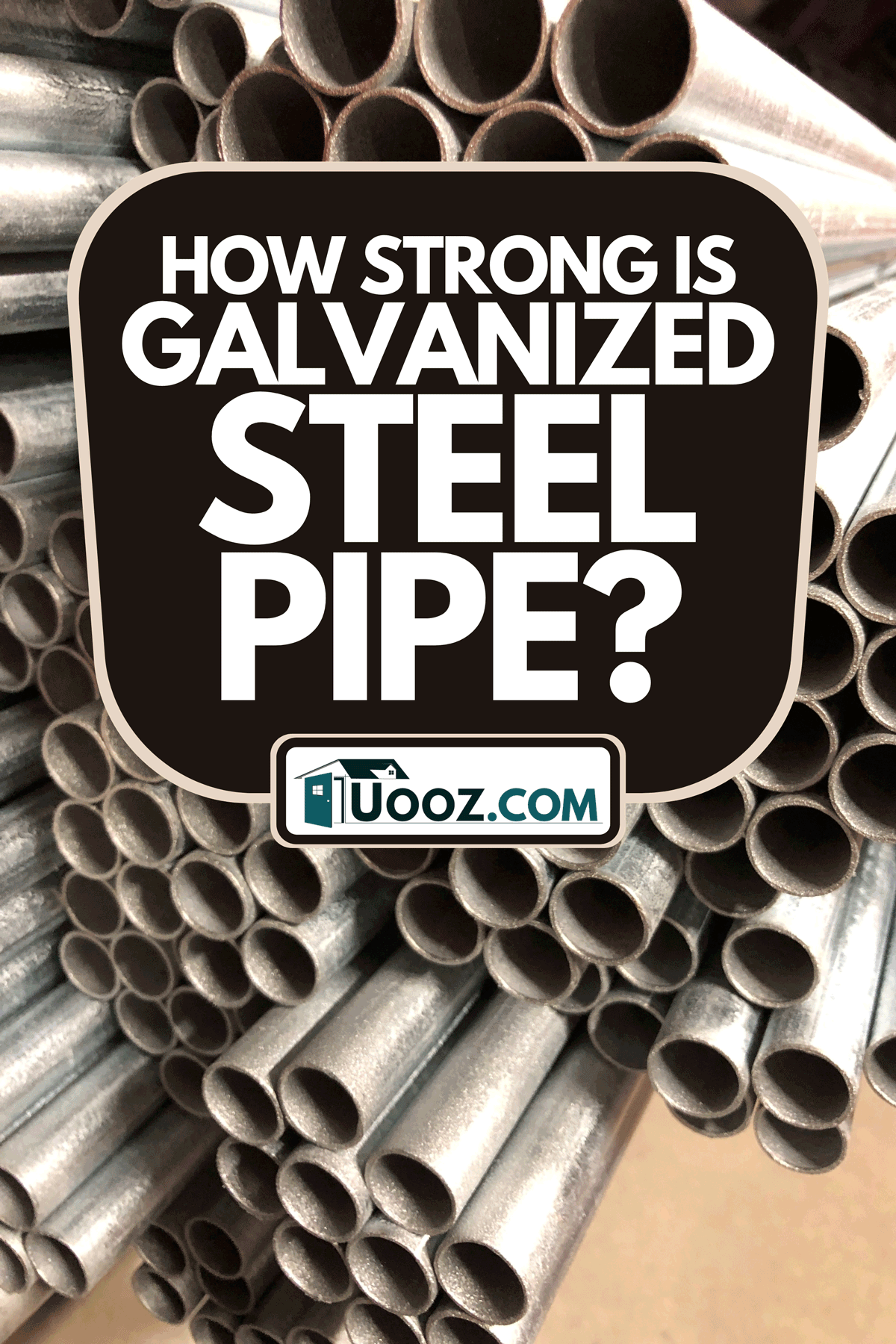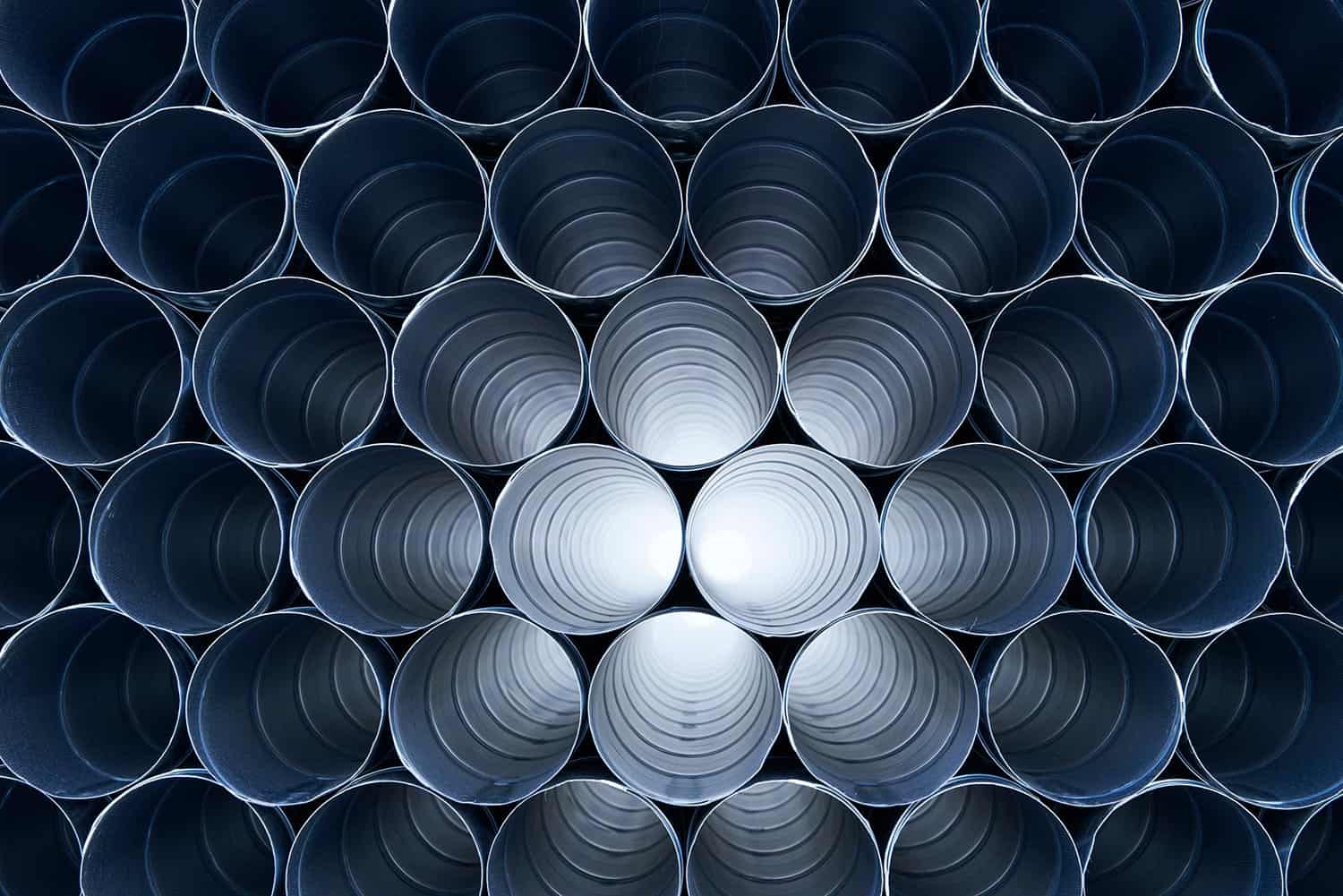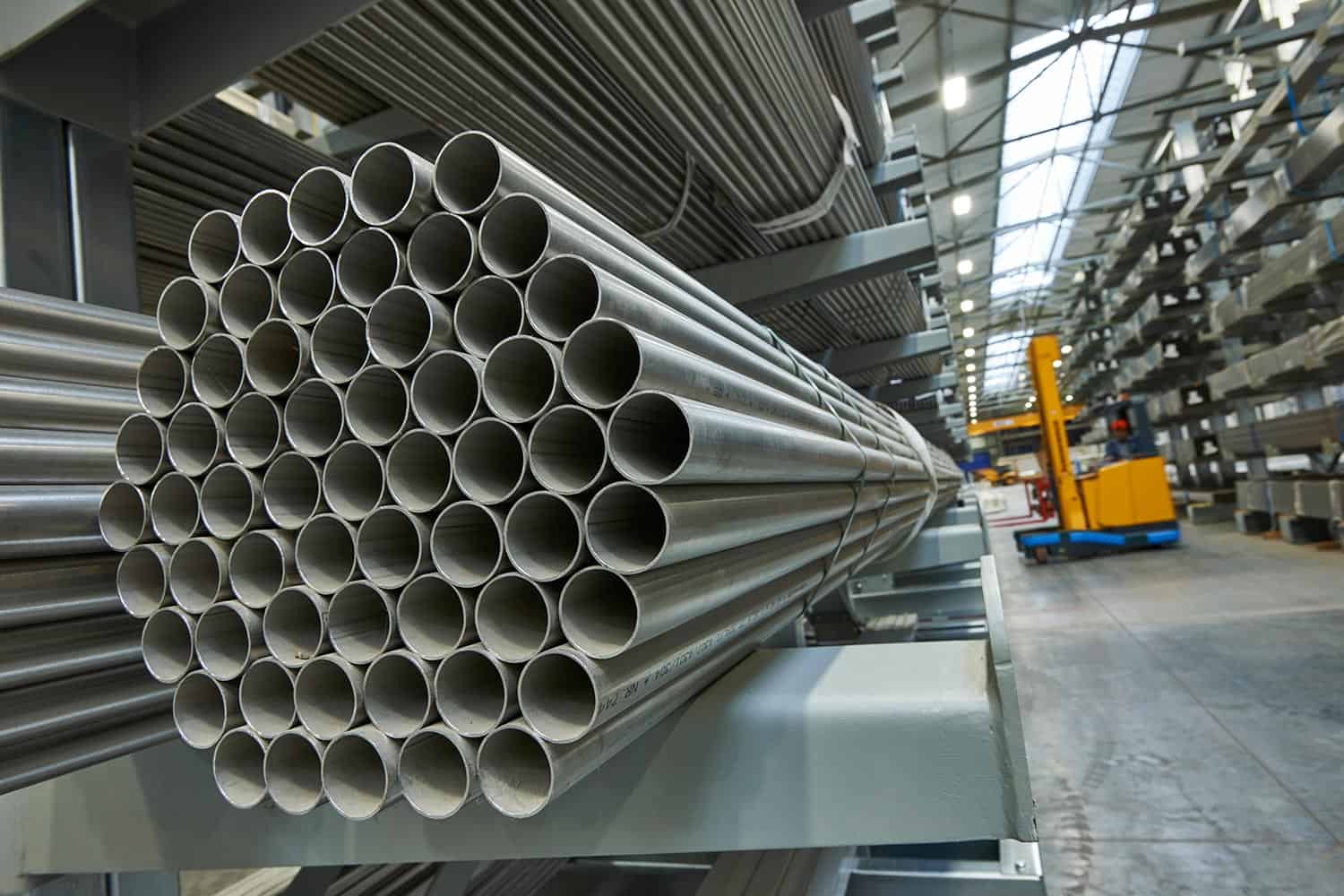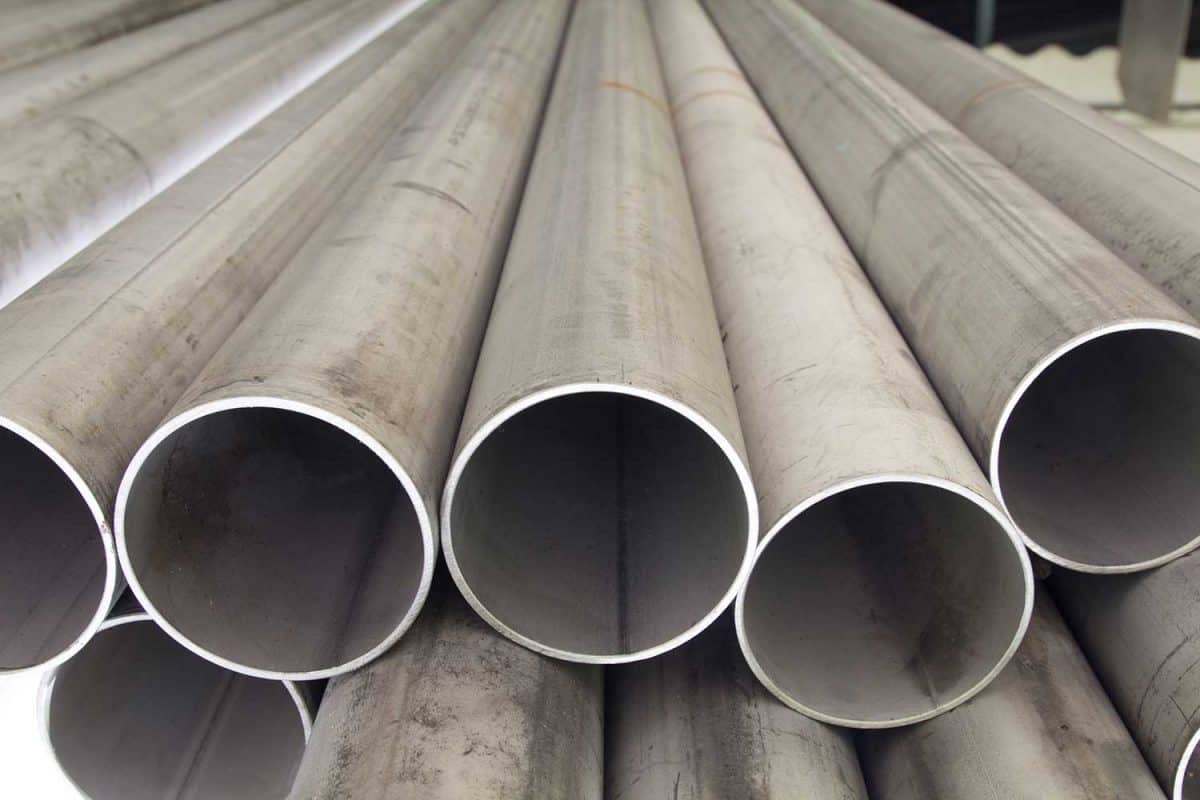The pipes running through your home deliver water, gas, sewage, and other materials to their appropriate locations. How strong, though, is galvanized steel pipe? We've researched this material to get the answer for you.
The standard yield strength of galvanized steel pipe ranges between 150 psi and 500 psi.
The strength of your galvanized steel pipe doesn't always distinguish its usability, though. Black pipe, for example, tends to be better for gas lines, while galvanized steel pipes are better for water lines. We've researched the distinguishing strengths and features of some of the most common home pipes and are ready to make sure that your next DIY project materials are as effective as possible.

How Strong Is Galvanized Steel Pipe?
The galvanizing process first came into practice in 1836. Stanislas Sorel pioneered the hot-drip galvanizing method, ensuring that stainless steel pipes received the molecular-transforming coat of zinc that defines the product today. Today, this process involves the following steps:
- Caustic cleaning
- First rinse
- Pickling
- Second rise
- Flux solution
- Drying
- Zinc baths
- Cooling
Galvanized steel garners the bulk of its strength from its unique make. When manufacturers hot-drip their stainless steel into molten zinc, the zinc creates a coating that forms perpendicularly to steel molecules. In addition to the width added by the zinc, that angle allows galvanized steel a particular longevity.
The strength lent to a galvanized steel pipe by this process is measured in PSI, or pound-force per square inch. Professionals choose to measure the strength of these pipes in PSI because of the pipes' common interactions with both liquids, in terms of well and tap water, and gases. On average, a galvanized steel pipe has a strength that ranges between 150 PSI and 500 PSI.
Thickening a Pipe
Note that there's more than one thickness of galvanized pipe available on the market. If you're interested in a galvanized steel pipe that's going to last you decades at a time, you'll want to find pipes that have a relatively thick zinc coating. This coating serves as a sacrificial layer, effectively taking on the corrosion or other damage that minerals might otherwise do to the pipe itself.
Is Galvanized Or Black Pipe Stronger?

When you're running pipes to and from new construction, you want to be certain that you're investing in the best of the best products available to you. There's more than one kind of pipe, after all, available on today's DIY market. Galvanized steel pipes have their benefits, but black pipe stands out in a crowd.
What is Black Pipe?
Black pipes are made out of steel, just like galvanized steel pipes. Unlike their galvanized cousins, though, black pipes are not exposed to zinc or any other chemical coatings. Black pipes don't even receive a coat of paint before they're delivered to your local hardware store or home.
That said, just because a black pipe isn't treated with certain chemicals doesn't mean that it isn't strong. Most black pipes have pressure ratings of at least 150 PSI. This makes them ideal for delivering oil to commercial institutions and gas to the rest of your home. You can also use these pipes to deliver steam and air pressure to applicable properties.
Black pipes do have a few weaknesses, though. The lack of chemical treatment can weaken black steel pipes to mineral corrosion. As a result, black pipes require regular maintenance and may become unusable before their galvanized cousins would.
A Contest of Strength
As mentioned, black pipe tends to cap its strength at 150 PSI. This limit, combined with the pipe's lack of chemical coating, does tend to make black pipe weaker than galvanized steel.
Black pipe is also cheaper than galvanized steel, making it an acceptable budget option for new construction and DIY projects. Before you request a black pipe installation, though, you'll want to discuss the appropriateness of the material with an area professional.
Is Galvanized Steel Stronger Than Steel?
Galvanized steel and stainless steel are effectively identical in appearance. That doesn't mean that the two pipes are interchangeable, though.
Stainless steel, rather, is a term that describes steel that has been mixed with at least 10% chromium. This amalgamation of metals makes stainless steel particularly resistant to mineral decay and age. As a result, stainless steel is less likely to rust than galvanized steel.
This combination of metals also allows for a difference in strength between galvanized steel and stainless steel. The chromium in stainless steel makes these pipes stronger and more durable than galvanized steel. The PSI of stainless steel on the market today varies based on the pipes you're interested in getting, but the range carries between 250 PSI and 7200 PSI.
The Benefits of Stainless Steel vs. Galvanized Steel

While you can expect stainless steel to last for decades while in use throughout your home, this investment can often put you over budget. Galvanized steel, comparatively, is a cheaper investment than its stainless cousin.
Does this mean that you should automatically value galvanized steel over stainless steel? Not exactly. Instead, see if your budget will let you mix and match the pipes you have running through your home.
Galvanized steel pipes, after all, can hold up well against moisture, making them ideal for your home's water lines. If you do want to invest in stainless steel lines, consider using galvanized steel pipes for your appliances and stainless steel pipes for your drinking water.
You can sit down with a local contractor to learn more about the benefits of mixing and matching the pipes throughout your home.
Is Galvanized Steel Rust-Proof?
The galvanization process does protect your galvanized steel pipes against rust. To impact the structural integrity of your pipes, minerals, and other corrosive materials must first make their way through a substantial layer of zinc. You can even invest in thicker-than-average pipes to ensure a longer lifespan for your pipes.
That said, there will come the point where your zinc layer starts to give way. With this in mind, galvanized steel pipes are rust-resistant but not rust-proof. If you're looking for a pipe that has slightly more rust resistance built into its molecular structure, you can talk to area professionals about stainless steel pipe installation.
Protecting Your Pipes From Rust and Corrosion
There are additional means through which you can limit the rust and corrosion your galvanized steel pipes come into contact with. The easiest ways to ensure sound, rust-free pipes include:
Inspect Your Pipes Regularly
Annual plumbing and pipe inspections help you stay on top of your home's overall condition. These inspections let the professionals in your area know what kind of weaknesses your pipes may be prone to and when it may be time to invest in preventative repairs.
Install Pipe Protections
Pipe protections, including specialized linings, can work in tandem with zinc to create barriers around your pipes. Everything from a pipe sleeve to a support beam can redirect the materials that might otherwise hasten along the rusting process.
Even your insulation can help limit the amount of corrosive debris your pipes come into contact with. You'll want a professional to inspect this insulation on a regular basis to ensure that it is still in good condition.
Stabilize Your Home
The stability of your pipes helps them maintain their overall functionality. If you want to limit the amount of contact your pipes have with corrosive substances, you'll need to make sure that they're unlikely to bounce or otherwise endure motion-based wear.
If you live in an area that sees frequent earthquakes, consider installing stabilizers beneath your home. Otherwise, you can use U-bolts and clamps to limit the amount of movement that your pipes regularly endure.
How Long Will Galvanized Steel Pipe Last?

On average, galvanized pipes tend to survive for between 80 and 100 years. So long as these pipes aren't exposed to natural disasters or unusual overuse, their zinc layers can provide them adequate protection against rust, corrosion, and other forms of wear up until this point. At about the 70-year mark, you may notice some decay in your pipes, but you can usually circumvent this with the help of an experienced professional.
Do note that galvanized pipes were often installed in American homes built before 1960. If you live in an older home and have been having trouble with your water pressure, gas delivery, and so on, consider investing in a pipe inspection. Your galvanized pipes may be coming to the end of their lifetime, meaning that it's time to start thinking about replacements.
Using Galvanized Steel Pipe in Your Home
Galvanized steel pipes are resistant to corrosion, strong, and long-lasting. When, then, isn't this pipe as popular as it used to be? Stainless steel tends to show up its galvanized cousin. Even so, galvanized steel pipes still have a use in the modern home.
If you're exploring water line options or additions to any home piping DIY, consider the benefits of cheaper, sturdy steel piping. Galvanized steel pipe can help you repair water lines and improve utility operations on a budget.
